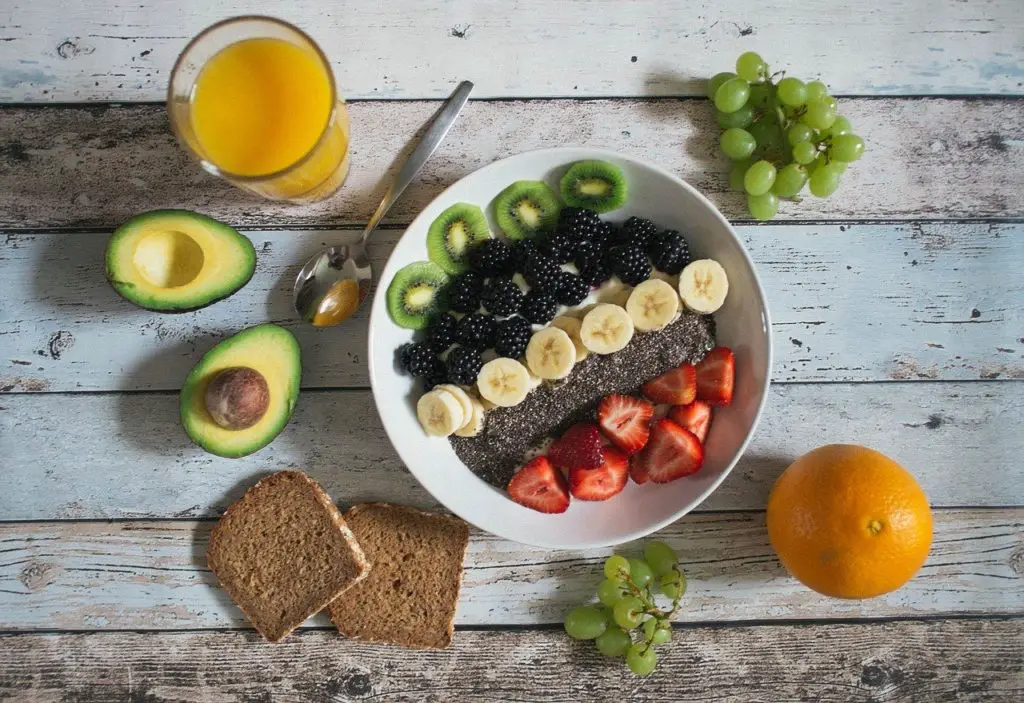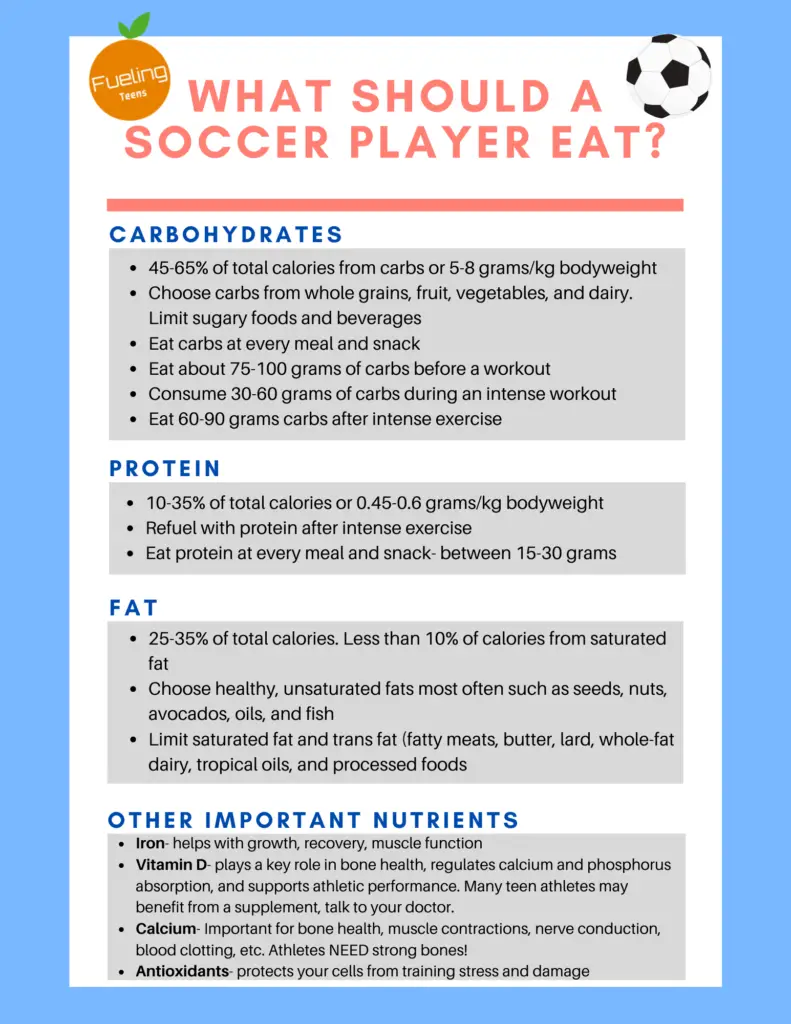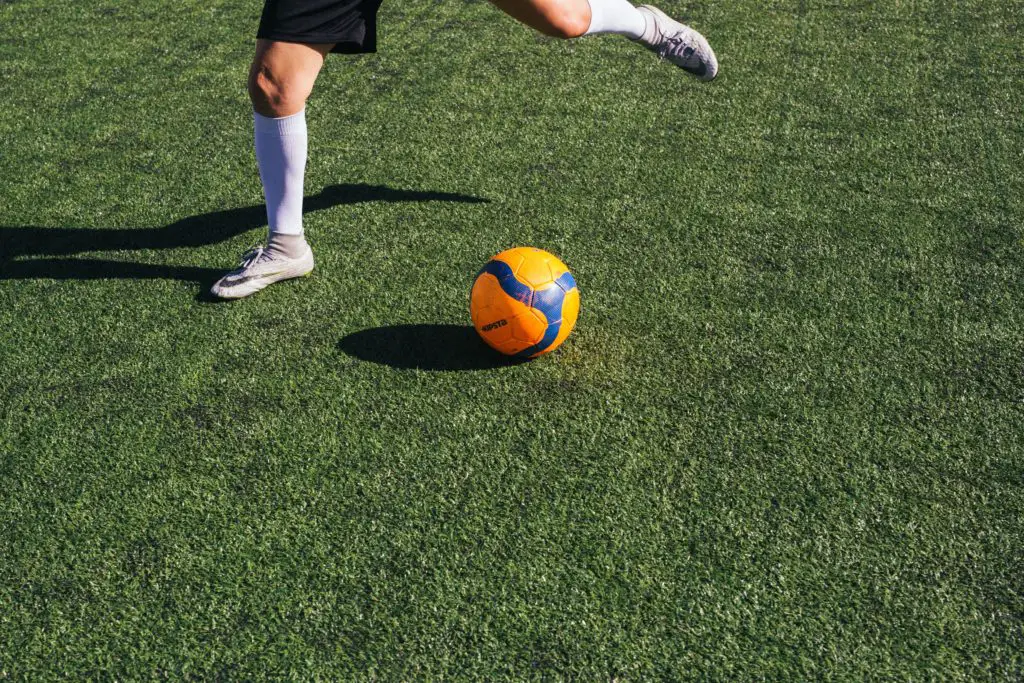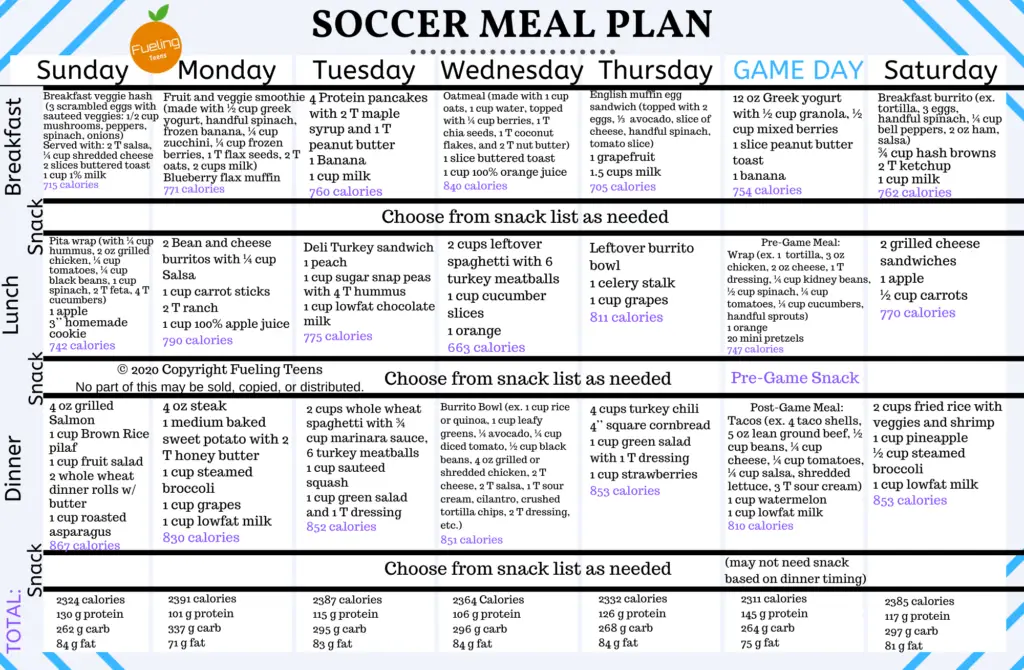Proper nutrition is just as essential as training for a soccer athlete, especially for a student athlete.
The best eating plan for soccer is 3 meals a day at 500-900 calories each with 1-3 snacks at 100-300 calories each. Meals and snacks should focus on healthy carbohydrates, enough protein, and fruits and vegetables.
Want to run faster, increase power, improve endurance, and build strength? The best way is through appropriate nutrition timed with training. Below I discuss the best eating tips for soccer players (protein intake, sports drinks, how much to eat, pre- and post- workout foods, what supplements to take, and more).
Whether it’s club soccer, high school soccer, or city league soccer, this meal plan can be adapted for females or males who play soccer!
Keep reading for the best eating habit tips for a teenage soccer player, plus a FREE weekly meal plan and downloadable nutrition tip sheet for soccer.

Free Meal Plan for High School Soccer Players
Soccer training is not just what happens on the field or in the gym.
Proper nutrition is essential for a high school soccer athlete. You shouldn’t be fueling your workouts with packaged snacks and sugary foods An appropriate nutrition plan will provide the best fuel and nutrients to help your body train well, recover quickly, and perform at the top of your ability.
The teenage years are an essential time to make healthy eating habits that will benefit you for the rest of your life. Eat smarter and you will improve so many aspects of your health and life!
Get started with a free one-week nutrition meal plan so you are ready for your season prepped with knowledge and food tips, and hopefully a stocked fridge and pantry full of healthy foods.
Make the most out of your soccer season and rise above the competition.
Soccer Parents, Please Help!
In general, high school soccer players practice for 2-3 hours every day after school, with 1-2 games per week, and sometimes an extra practice on Saturday, plus homework, jobs, and other extracurricular and social activities. Sound familiar?
The average teenager is busy (plus developing, growing, and learning how to be responsible and handling their own schedule), so by adding soccer practice each day, a high school soccer player can be extremely busy. Trying to eat a proper diet with this hectic schedule is very difficult, plus many athletes lack the skills to plan, shop for, and prepare their own meals.
Even with time restraints it is possible for teenage athletes to meet daily nutritional needs. Teen athletes need the support and help of a parent/guardian, as well as other family members, friends, and coaches if they want to make healthy changes to their eating habits. It takes a team!
This age group’s skill level for food preparation is generally low. In writing my meal plans, I assume that at least one parent/guardian helps with grocery shopping and food preparation.
The teenage years are a great time to become involved in food preparation to learn cooking skills, proper nutrition, and grocery shopping habits. All of these skills and habits will set athletes up for longterm success and a healthy lifestyle.
Parents, please help your soccer athlete– ensure they are getting an adequate breakfast, have access to food for lunch and snacks, and please do your best to cook a nutritious family dinner. This can be a good time to improve nutrition for the whole family! I’m planning on being a soccer mom in a few more years too, but for now I’ll have to practice on you!

How Many Calories Should a High School Soccer Player Eat Per Day?
How much should a soccer player eat per day? A teenage soccer athlete may need anywhere from about 2500-4000 calories per day depending on weight, height, gender, activity level, etc. I tend to recommend around 3,000 calories per day for males and 2,400 calories per day for females, as many athletes tend to fall around that category.
A high school soccer player should eat about 30-35 calories per kilogram of body weight per day. To calculate your own recommended calorie range, take your weight in kilograms (2.2 kg=1 lb so divide your weight in pounds by 2.2) and multiply it by 30 and then 35.
That should give you a pretty good range of calories. (For example, a 170-pound athlete weighs 77 kg, so 77 multiplied by 30=2,310 calories, then multiplied by 35=2,695 calories. So the range is about 2,310 to 2,695 calories per day).
You can also estimate your calorie recommendations with this helpful chart:
Daily Calorie Recommendations for Active Teenage Male and Female Athletes:
| Age: | Active Teen Males: | Active Teen Females: |
| 13 | 2,600 calories | 2,200 calories |
| 14 | 2,800 calories | 2,400 calories |
| 15 | 3,000 calories | 2,400 calories |
| 16 | 3,200 calories | 2,400 calories |
| 17 | 3,200 calories | 2,400 calories |
| 18 | 3,200 calories | 2,400 calories |
| 19 | 3,000 calories | 2,400 calories |
I only included calorie recommendations for active teenagers, as soccer athletes usually practice and train for around 2-3 hours per day. If athletes aren’t as active off-season, they will need fewer calories. This is also true during rest days.
My meal plan below is written for about 3,000 calories per day, but can easily be adjusted based on needs.
I don’t usually recommend for teenagers to count calories daily (unless they have specific goals), but to instead learn to eat an appropriate amount of food and nutrients at appropriate times throughout the day. It’s best to learn how to eat by listening to hunger cues and also keeping in mind overall nutrition recommendations to fuel workouts.
What Should A Soccer Player Eat Daily?

Check out my free downloadable tip sheet!
A teen soccer player should have a balanced diet of each of the macronutrients- carbohydrates, protein, and fat, as well as micronutrients- vitamins and minerals.
Here’s a quick example of foods from each of those categories:
- Carbohydrates: Choose carbs from healthier options such as fruit, vegetables, brown rice, sweet potatoes, oatmeal, whole wheat bread/pasta/tortillas, etc. Limit intake of processed carbohydrates such as white bread, sugary foods, and dessert.
- Protein: Choose poultry, fish, beans, legumes, low-fat dairy and other lean proteins.
- Fat: Choose healthier fats such as olive oil, nuts, seeds, fish, avocados. Limit butter and fried foods.
- Vitamins/Minerals: Eat a variety of food of all colors, shapes, and textures from each of the food groups for the greatest benefit, including fruits and vegetables, whole grains, dairy, meat and beans. Important nutrients for high school soccer players are:
- Iron– choose animal sources (red meat, poultry) and plant sources (beans, lentils, tofu, whole grains, dark green leafy vegetables)
- Vitamin D– from sun exposure and fatty fish, egg yolks, and fortified foods such as milk
- Calcium– dairy products, leafy green vegetables, broccoli, beans
If you are eating a balance of the food groups throughout the day, then you’ll be getting enough of the nutrients listed above.
At approximately 3,000 calories per day, your daily food group recommendations are:
- Dairy : 3 cups per day. Choose low-fat products such as milk, yogurt, cottage cheese, cheese, etc. Dairy-alternatives can also be a great choice as well for teenagers as-needed. (For more information on dairy-free options, check out this article I wrote here.)
- Fruit: 2 1/2 cups per day. Choose a variety of colors, textures, and forms such as fresh, frozen, dried, canned, cooked, and 100% juice.
- Vegetables: 4 cups per day. Choose a variety of colors and forms such as fresh, frozen, canned, dried, cooked, and juice.
- Protein Foods: 7 ounces per day. Choose a variety of lean meats, poultry, fish, beans, nuts, seeds, eggs.
- Grains: 10 ounces per day. Choose healthy grains such as whole grain bread, tortillas, pasta, crackers, cereal, rice, quinoa, oats.
Meal Plan Recommendations for Soccer Players:
- Soccer players should eat about 3 meals per day and about 2-3 snacks.
- Meals should be around 600-800 calories each and snacks about 100-300 calories each.
- Don’t go more than 3-4 hours without eating.
- Eat a pre-workout/pre-game snack between 30 minutes and 3 hours before your workout.
- Eat a post-workout snack or meal 30 minutes to 1 hour after exercise.
This is what a sample day would look like for a high school soccer player:
- 6:30am Breakfast
- 600-800 calories
- Eat a regular meal focused on healthy carbs and lean protein
- Examples:
- Eggs, toast, fruit, milk
- Oatmeal with fruit
- Granola and Greek yogurt
- Green smoothie and eggs
- Whole wheat pancakes/waffles, nut butter, milk
- Avocado toast and fruit
- Whole wheat muffin, slice of ham, fruit
- Whole wheat bagel, eggs, ham
- etc.
- 10:00am Mid-Morning Snack (if needed)
- About 100-300 calories
- Light snack of protein and carbs
- Bring from home and eat during breaks between class
- Examples:
- Almonds
- Banana, celery, apple, or crackers with peanut butter
- String cheese and an apple
- Hummus and veggies
- Pretzels and peanut butter
- Small handful of trail mix
- etc.
- 12:00pm Lunch
- About 600-800 calories
- Focus on healthy carbs, lean protein, and vegetables
- Try to bring a lunch from home
- Examples:
- Sandwich with deli meat, fruit, pretzels, carrots
- Chicken/veggie wrap and fruit
- Rice, lean beef, mixed veggies
- Pita wrap with hummus and veggies
- Bean burrito and veggies
- etc.
- 2:30pm After-School/Pre-Workout Snack
- 1-2 hours before workout
- About 100-300 calories
- Eat something light but with carbs and protein
- Examples:
- Hummus with whole wheat crackers and veggies
- Protein shake
- Greek yogurt with fruit and granola
- String cheese and crackers
- Trail mix
- Apple with peanut butter
- Cottage cheese and fruit
- Cold cereal and milk
- Check out my pre-workout snacks post for more ideas
- 5:00pm Post Workout Snack (if needed before dinner)
- About 100-300 calories
- Replenish and refuel with protein, carbs, and fluid.
- This snack is optional if dinner is soon after practice. Don’t forget lots of water!
- Examples:
- Protein shake or smoothie
- Chocolate milk
- Protein bar
- Energy bar (such as LARABAR)
- Greek yogurt with fruit
- 6:30pm Dinner
- 600-800 calories
- Eat a regular meal. Focus on healthy carbs, lean protein, and vegetables
- Always eat dinner at home, this is prepared by the parents with help from the athlete
- Examples:
- Fish, brown rice, broccoli
- Taco salad
- Chicken, sweet potato, and black beans
- Whole wheat pasta with sauce, meat, and veggies
- Turkey burger and steamed mixed veggies
- Chicken and veggie pizza
- 8:00pm Evening Snack (if needed)
- About 100-300 calories
- Examples:
- Popcorn
- Smoothie popsicles
- Chips and salsa
- Yogurt and berries
- Apple and peanut butter
Tips for School Lunches: Many high school soccer players depend on school lunches to meet their nutritional needs. School lunches are designed to give the average student proper nutrition, however they don’t take into account the extra nutritional needs of soccer players.
USDA requirements for school lunch are often not enough for athletes. Soccer players may need to supplement school lunches with food from home, or bring a meal from home.

Eating Healthier
The most popular foods for school soccer players tend to be meat and protein foods, as well as carbohydrate foods such as hamburgers, pizza, burritos, french fries, pasta, eggs, and chicken. The least popular and least consumed foods are vegetables.
Vegetables are essential for a healthy diet for a soccer player. Vegetables are low in calories and high in beneficial nutrients. You can eat them in many different ways and even frozen, canned, and cooked veggies have benefits.
Make a goal to eat more vegetables, choose 5-10 vegetables that are easy to prepare and take on-the-go for quick snacks and meals. Keep these options stocked in your fridge and pantry at home. The “favorite” foods listed above are still allowed, but with moderation. Pair some of the favorite foods with vegetables for a better balance at meals.
Need more help and ideas for your soccer player’s nutrition plan?
FREE One Week Meal Plan for A High School Soccer Player:
This meal plan is made for 3000 calories per day with 3 meals and 3 snacks, with about 600-800 calories per meal and 100-300 calories per snack. You’ll notice each day’s calorie total is around 2400 calories to allow around 600 additional calories for your choice of snacks.
This is just a suggestion to get you started, keep in mind many athletes may need more or less calories depending on their size, activity level, and personal goals. You may also need to adjust the schedule and calorie levels and meals and snacks based on individual preference, hunger levels, and tolerance.
I like to include a variety of favorite foods- burritos, hamburgers, pizza, but with healthier spins and all in an appropriate balance. Soccer players don’t need to “diet” during their season, they just need to eat smarter.
Hope this meal plan is helpful! It can be a great starting place as you work with your teen and make an individualized plan. Let me know if you are interested in a month-long meal plan here: fuelingteens(at)gmail.com

Click here to view larger, or to download and print.
Here’s the snack list options that go with the meal plan:
- 1/4 cup hummus with 6 whole wheat crackers and veggies
- 12 oz protein/fruit smoothie
- 1 cup Greek yogurt with granola and fruit
- 1 cup low-fat cottage cheese and fruit
- 1/4 cup trail mix
- 1/4 cup almonds and 1 apple
- 1 banana or apple with 1 T peanut butter
- string cheese and 8 whole wheat crackers
- 1.5 cups cereal and 1 cup milk
- 12 oz chocolate milk
- string cheese and an apple
- 1/2 cup pretzels and 1 T peanut butter
- PB&J sandwich
- energy bar
- 1 cup juice and 2 hard-boiled eggs
- rice cake with 1 T nut butter and banana
- string cheese and 4 oz applesauce
What Should A Soccer Player Drink?
There’s so many choices for hydration- water, gatorade, other sports drinks, chocolate milk, juice….. Water is almost always the best choice (but keep reading to see when sports drinks are appropriate). Water is the most hydrating and best option for most training sessions and sporting events.
If your workouts are one hour or less, or longer but not very intense, just drink water. That’s the best option for fluid.
You don’t need anything else- you’ll just be wasting money and probably drinking too much sugar and calories if you choose a sports drink or energy drink. Gatorade has a lot of sugar and you don’t need that unless you are burning lots of calories and sweating intensely.
When Are Sports Drinks Appropriate?
Ask yourself:
Is your workout longer than 1 hour?
Is your workout intense the whole time?
Are you sweating heavily?
If you answered yes to ALL of these questions, then you likely need a sports drink, or some type of carbohydrates, during exercise in order to keep your muscles fueled with maximum energy for your whole workout.
You can choose a sports drink with a moderate amount of carbohydrates, some watered down juice, fruit, dried fruit, or something similar during exercise. You’ll want about 30 grams of carbohydrates per hour, which is equal to about 20 oz of a sports drink per hour of heavy-sweating, intense exercise.
Juice or milk, especially chocolate milk, can be appropriate for post-workout beverages. Chocolate milk is a favorite because of the delicious taste, while it also replenishes carbohydrates, protein, and fluid.
For more information and tips on sports drinks during training and games, check out my post “Should High School Football Players Drink Gatorade?” (The tips apply to any sport!)
Fluid Recommendations for Soccer Players:
- Stay hydrated with water during the day- don’t drink sugary beverages or sports drinks
- 1 hour before exercise drink at least 16-24 oz (2-3 cups) of water
- Drink 8 oz of water before your workout and 4-8 oz (1/2 – 1 cup) every 15 minutes of an intense workout. A sports drink may be needed
- Hydrate after a workout
What Supplements Should a High School Soccer Player Take?
In general, high schoolers don’t really need any supplements, unless a deficiency is likely. However, a daily multi-vitamin at this life stage may be beneficial to help with growth and development for a high school athlete.
Popular supplements among high school athletes are BCAAs, protein powders, caffeine, creatine, sodium bicarbonate, nitrate, and collagen. Most of these are not recommended for a growing teenage athlete unless there is a deficiency or for certain individuals whose diet may be lacking in certain areas (ex, vegans, individuals with allergies, and other health conditions).
Remember- a good supplement can never make up for a bad diet! It is almost always better to get nutrients from food rather than from supplements of any kind. Certain vitamin/mineral supplements may oftentimes be helpful for teenage athletes, such as iron for some females, vitamin D, etc. Talk to your doctor before adding any supplements. Possible benefits do not outweigh the consequences.
Check out these posts for more info on supplements:
Summary:
- High school soccer athletes should focus on eating a balanced diet with regular meals throughout the day. Meals should focus on healthy carbohydrates, lean protein, and healthy fats.
- Pre-workout snacks and meals should be focused on carbohydrates and fluid with a moderate amount of protein.
- Post-workout snacks and meals should focus on refueling and replenishing carbohydrates, protein, and fluid.
- Soccer players should limit sugary and processed foods and beverages.
Related Questions:
What Should I eat 2-3 Hours Before a Soccer Game? The best meal or snack before a game includes lots of carbs and fluid, moderate amounts of protein, and lower amounts of fat and fiber. The best options are ones that you know your stomach can handle. Y
ou might also benefit from a snack 30 minutes to 1 hour before game-time as well. Include carbohydrates like fruits, vegetables, grains, etc. which will provide consistent energy to the body over the next few hours. Avoid spicy foods, fried foods, and high fat, high fiber, and high protein foods.
Check out my post on Pre-Workout Snacks for more ideas. Some great options are a PB&J sandwich, energy bar, pretzels and grapes, bananas with nut butter, juice and string cheese, etc.
What Foods Should High School Soccer Players Avoid? Limit foods with excessive fat, sugar, and salt, and other foods that are high in calories but low in nutrients. You should also limit excessive amounts of supplements (including protein powder), caffeine, sugary treats and desserts, soda, fried foods, fast foods, alcohol, etc.
I wrote a whole post about the worst foods for football players. Check it out here: The Worst Foods to Eat Before Football. In general you don’t necessarily need to eliminate foods, but rather limit certain types of foods.
What Should Soccer Players Eat for Breakfast? The best breakfast on game day for soccer players includes complex carbohydrates, protein, and some healthy fats. Some great ideas are homemade oatmeal, eggs with veggies and toast, or fruit and Greek yogurt.
What Fruits are Good for Soccer Players? Some of the best fruits a soccer player can eat before a game are bananas, apples, grapes, oranges, or even dried fruit. Some of the best post-game fruits for refueling and recovery are cherries, berries, oranges, pears, watermelon, and bananas.
Check out my post for more information: Best Fruit for Teenage Athletes
See Also:
- Is Whey Protein Safe For Teenage Athletes?
- The Perfect Size and Weight for a Football Player
- How Many Calories Does a Teenage Athlete Need?
- What Should a Teenage Girl Eat in a Day?
- Best Meal Plan for Teenage Athletes
Eat. Play. Win!
Written by Katherine Harmer, Registered Dietitian Nutritionist
Fueling Teens is a participant in the Amazon Services LLC Associates Program, an affiliate advertising program designed to provide a means for sites to earn advertising fees by advertising and linking to Amazon.com. We also participate in other affiliate programs which compensate us for referring traffic.

